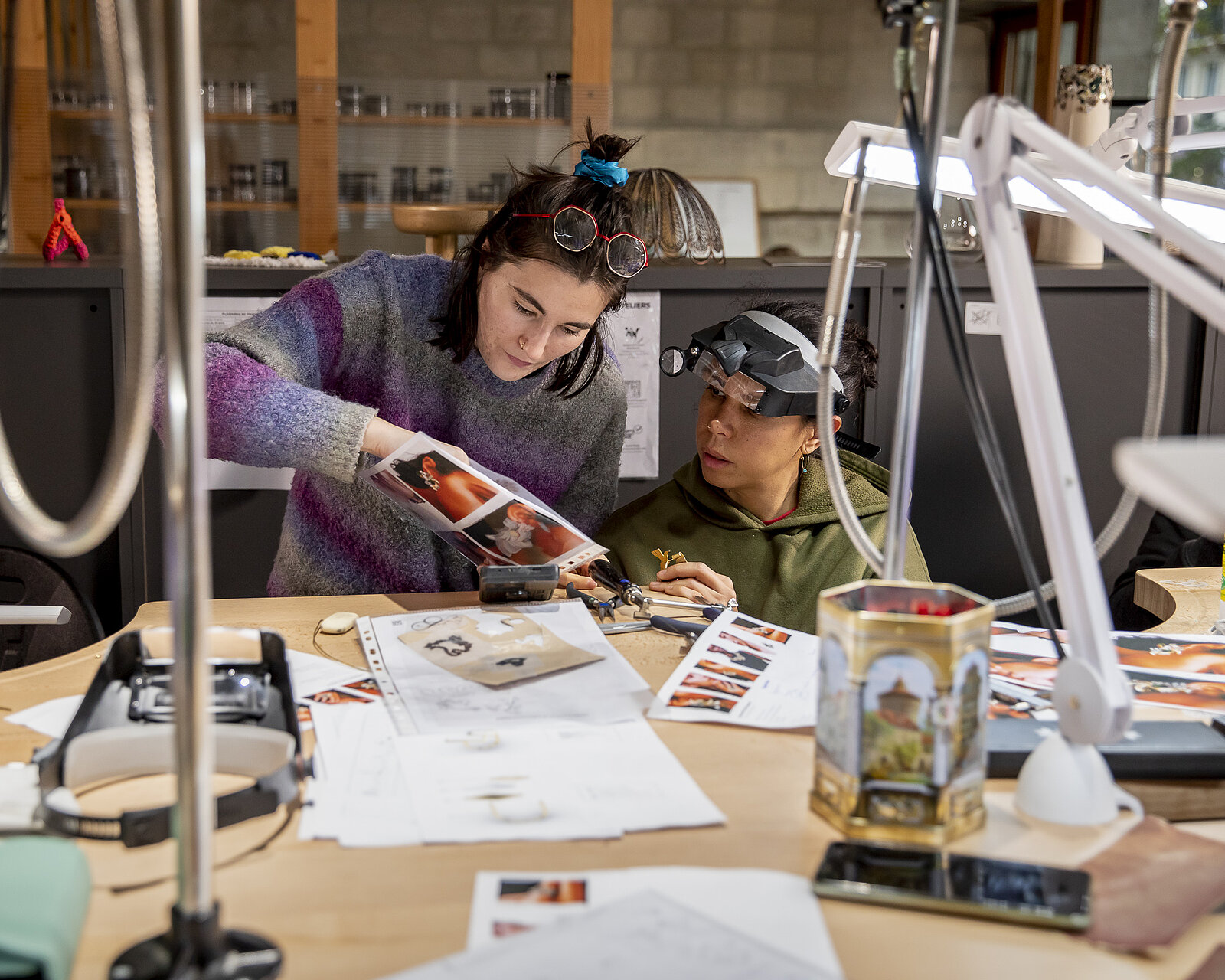At La Fabrique nomade, refugee artisans reconnect with their craft
November 2024 1bis avenue Daumesnil, Paris 12

When they leave their home country, many exiles leave everything or almost everything behind. This includes remarkable skills, such as those possessed by artisans. Hindered by language barriers, a loss of self-confidence, and caught in the urgency of having to stabilise their situation at a minimum, many accept precarious and unskilled jobs in the pressured sectors they are systematically directed to upon their arrival in France.
« A true waste of skills », laments Inès Mesmar, who decided to take action. In January 2016, she opened La Fabrique Nomade, an association that works for the professional integration of these refugee artisans.
CDD of integration, certified pathway at the Viaduc des arts
They are Afghan, Iranian, Senegalese, Kurdish, Tunisian, Chinese, Venezuelan, or Russian and share the commonality of being exceptional artisans, recognised in their home countries. However, to value this talent and prevent it from being lost with their migration, passing through La Fabrique Nomade is often beneficial.
« Here, we offer them a ten-month insertion CDD during which they can follow a unique pathway, combining training, French classes, and practical professional experience in the workshop, as we work on real professional projects for clients and our own collections », explains Inès Mesmar, founder of the association. At the end of these ten months, the artisans present their work before a jury to validate this certified pathway, enabling them to access jobs related to their craft more easily.
Today, three trades are supported by La Fabrique Nomade: sewing, embroidery, and jewellery making. « At first, we supported 22 trades, from basketry to glassworking, including metalwork and many others », continues Inès Mesmar. « But we decided to focus on those that were most represented and most aligned with market dynamics. »
Transforming lives
For Inès Mesmar, creating a space for creation and training for exiled artisans became a necessity in 2015. « I discovered wonderful embroideries that my mother had made in my mother’s cupboards », she recounts. « So, at the age of 35, I learned that my mother had been a talented embroiderer in her country. Yet, she had never spoken about her profession. I was indignant to see that she unfortunately hadn't been able to find her place professionally, nor the resources to showcase her skills in France. »
At that time, Europe was in the midst of a migration crisis. Inès was crossing the refugee camps that had set up in Paris and its surroundings every day. « I had the intuition that, like my mother, among all these people, there were other artisans with unsuspected skills. So, I transformed my indignation into action and created La Fabrique Nomade » continues Inès Mesmar.
Since 2016, around a hundred people have passed through the association, which continues to support their journey even today. « Approximately 80% have found paid employment at the end of the programme, » assures the founder, who explains: « Some have become self-employed, but more out of necessity, as their sector requires it. Generally, these artisans prefer salaried positions, which signify stability. »
This was the case for Katayon, who was in her fifties when she left her home country, Iran, for France. « After a troubled life journey, this seamstress with many years of experience gave everything she had. And at the end of her time at La Fabrique Nomade, she was hired on a fixed-term contract and then a permanent contract at Dior. She is a true fighter and now a fulfilled and transformed woman », rejoices Inès Mesmar.
Inès Mesmar has many stories like Katayon’s. And for each, there is an inspiring outcome that transforms lives. « In their migration, many people lose confidence in themselves and, even, a part of who they are. By highlighting their talent, we not only show another perspective on migration, but we also help these individuals feel fully integrated into society. Refugees are no longer an undifferentiated mass of people, but talents who have much to contribute », summarises Inès Mesmar.
At the heart of artisanal craftsmanship
Established at the Viaduc des Arts since 2018, La Fabrique Nomade occupies two arches. One houses the embroidery and jewellery workshops on the ground floor, while the sewing workshop is located in the basement; the other offers a training room, a kitchen space, and the association's offices.
« Being part of this place, which is a symbol of Parisian artisanal craftsmanship, is wonderful. The symbolism is very strong: it means, in a way, that we are giving the same place to our artisans. It’s about integrating them within this sector and the ecosystem represented here », celebrates Inès Mesmar.
La Fabrique nomade
1bis avenue Daumesnil, Paris 12
lafabriquenomade.com
© Photo : Nicolas Scordia
Viaduc des arts (1-129 avenue Daumesnil, 75012 Paris)
Paris celebrates 100 years of artisanal excellence! July 202515, 73 et 111 avenue Daumesnil, 75012 Paris
Maison Tassin has moved into the Viaduc des arts May 2025111 avenue Daumesnil, Paris 12
A day in time, where the art of costume meets photography February 202569 avenue Daumesnil, Paris 12
The Viaduc des arts is celebrating this December: discover the program December 20241-129 avenue Daumesnil, Paris 12
Cécile et Jeanne, jewellery creation since 1990 November 202449 avenue Daumesnil, Paris 12
At La Fabrique nomade, refugee artisans reconnect with their craft November 20241bis avenue Daumesnil, Paris 12
Estampille 52, high-end cabinetry November 202491 avenue Daumesnil, Paris 12
Serge Amoruso, high-end leather goods at heart October 202437 avenue Daumesnil, Paris 12


